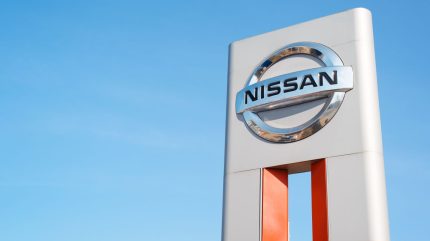
Nissan Motor’s financial performance deteriorated significantly in the second quarter of the current fiscal year, between July and September 2024, with global revenues falling by 5% year-on-year to JPY2,986bn while its operating margin dropped below 0.2%. The company incurred a net loss of JYP9.1bn (US$61m) in this period, compared with a net profit of JPY191 in the previous quarter.
Nissan also announced it had cut its revenue projection for the full fiscal year, which ends in March 2025, by 10% to JPY12,700bn from its previous forecast of JPY14,000bn, indicating that it expects operating conditions to continue to deteriorate for at least the next two quarters. The company reported that its global vehicle production fell for the fifth consecutive month in October, while global sales declined for the seventh straight month.

Discover B2B Marketing That Performs
Combine business intelligence and editorial excellence to reach engaged professionals across 36 leading media platforms.
Financial investors were clearly disappointed with its latest financial results, sending the automaker’s share price plunging by 10% immediately after the results were released – to levels not seen since the peak of the Covid pandemic in 2020. Investors had already become disillusioned with the company’s propensity to over-promise and under-deliver and were also unimpressed by the cancellation of the interim dividend.
In its latest financial statement, Nissan said it is “facing a severe situation” and that it is “taking urgent measures to turn around its performance and create a leaner, more resilient business capable of swiftly adapting to changes in the market.” A senior Nissan official is reported to have said: “We have 12 or 14 months to survive.”
Nissan said it aims to “urgently” reduce fixed costs by JPY300bn, compared with the last fiscal year, and cut variable costs by a further JPY100bn – with measures aimed at lowering “selling, general and administrative expenses, decrease the cost of goods sold, rationalize its asset portfolio, and prioritize capital expenditures and investments in research and development”. It said it plans to cut its global production capacity by 20% and reduce its global workforce by 9,000 people.
Nissan has also cut its stake in Mitsubishi Motors, one of its strategic partners, from 44% to 34%, raising JPY69bn (U$460m) to help shore up its balance sheet. The company’s CEO, Makoto Uchida, even forfeited 50% of his monthly compensation starting in November 2024 to help save costs, while other board members have also agreed to significant pay cuts.
Makoto Uchida has set a target of “stabilising” the business, aiming for it to become profitable and cash-generative with global sales of 3.5 million units annually by fiscal 2026. Key objectives include increasing sales per model and accelerating the transition to eco-friendly vehicles. The company stated that it will continue to “diligently” execute its “Arc” medium-term business plan, which includes reducing new product development lead times to 30 months, enhancing investment efficiency and improving product competitiveness through its strategic partnerships with Renault Group, Mitsubishi Motors and Honda Motor. It remains to be seen whether these efforts will be enough, however.
With Renault continuing to sell down its stake in Nissan, it is also reported that the Japanese automaker is searching for a new “anchor” investor (possibly Honda with which it has a strategic partnership in the electric vehicle segment), to help it navigate through the next year.
Asia-Pacific performance particularly weak
Nissan reported a slight increase in global sales to 2,777,398 vehicles in the first ten months of 2024, despite recent declines. Weak sales in China and other markets in the Asia-Pacific region were offset by stronger sales in North America and Europe. The company has already undertaken some restructuring in the Asia-Pacific region to reduce overcapacity, with further cuts also planned.
Nissan’s sales in China dropped by 10% to 496,998 units in the first nine months of 2024, reflecting weak overall demand and strong competition from domestic brands – including heavy discounting. At the end of 2022 its Dongfeng Nissan joint venture transferred ownership of one of its vehicle manufacturing plants to its Chinese partner, state-owned Dongfeng Motor, and closed its relatively new Jiangsu plant earlier this year.
Nissan still has significant overcapacity in China and is expected to continue consolidating its manufacturing base there, while stepping up the release of new energy vehicle (NEV) models.
In Southeast Asia, Nissan has also struggled with weak demand and rising competition, particularly from Chinese brands that have expanded into the region over the past two years.
Nissan’s sales in Thailand plunged by 43% to 7,368 units in the first nine months of the year, underperforming in a very weak market. The company operates two vehicle assembly plants in the country with a combined production capacity of 370,000 units per year. Last year they produced fewer than 102,000 vehicles, with local sales amounting to just 16,423 units and the remainder exported to global markets.

Nissan is understood to be planning to consolidate vehicle production at one of the two plants by September 2025 and keep the older plant as a component manufacturing facility, probably to make EV powertrain components and batteries. It expects the restructuring to result in the loss of around 1,000 jobs.
Nissan’s decline in Indonesia is perhaps the most alarming. From peak sales of over 67,000 vehicles annually in 2012, its deliveries are unlikely to significantly exceed 1,000 units this year. The company ceased production at its two vehicle plants in the country several years ago and now outsources assembly of its Livina model to Mitsubishi in very limited volumes.
Nissan withdrew from the South Korean market at the end of 2020 due to falling volumes and high costs. Elsewhere, Nissan said it expects to reduce its workforce in the US, one of its better-performing markets, by 6%—or about 1,000 employees—through early retirement.
The crisis for Nissan – which threatens to become existential – is far from over.






